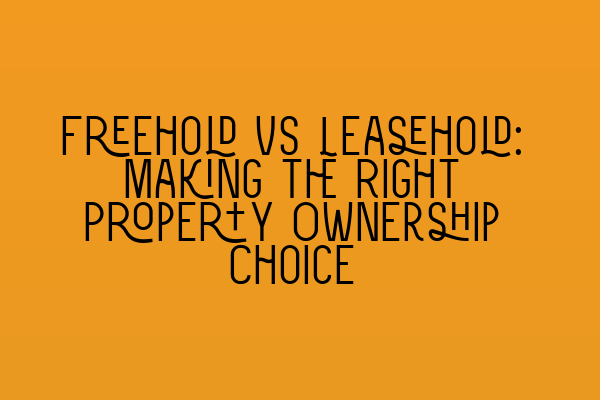Freehold vs Leasehold: Making the Right Property Ownership Choice
When it comes to buying a property, one of the most important decisions you’ll need to make is whether to opt for freehold or leasehold ownership. Each option has its advantages and disadvantages, and understanding the differences between the two can help you make an informed choice. In this article, we will explore the key aspects of freehold and leasehold ownership, so you can confidently decide which option suits your needs.
What is Freehold Ownership?
Freehold ownership, also known as fee simple ownership, grants you full ownership of both the property and the land it stands on. When you buy a freehold property, you become the sole owner and have complete control over the property. This means you don’t have to pay ground rent or obtain permission for external alterations, providing you with greater freedom and autonomy.
Benefits of Freehold Ownership
There are several benefits associated with owning a freehold property. Firstly, you have the security of knowing that you have complete control and ownership over your property. This can be particularly appealing to those who want the freedom to make decisions without seeking approval from a landlord or management company.
Another advantage of freehold ownership is that you won’t have to worry about leasehold restrictions. Leasehold properties often come with various restrictions, such as limitations on pet ownership or restrictions on making structural changes. With freehold ownership, you have the flexibility to alter and adapt your property to suit your preferences and needs.
Furthermore, freehold ownership provides a sense of financial security. Unlike leasehold properties, where the lease term diminishes over time, freehold properties can hold their value more effectively. This can be particularly important when it comes to selling your property, as freehold homes tend to be more attractive to potential buyers.
Understanding Leasehold Ownership
Leasehold ownership, on the other hand, grants you the right to occupy a property for a specific period of time, subject to the terms of the lease agreement. In this scenario, you are essentially leasing the property from the freeholder, who retains ownership of the land.
Benefits of Leasehold Ownership
Leasehold ownership can offer some advantages, especially for those looking for a more manageable property arrangement. For instance, maintenance responsibilities often lie with the freeholder, meaning you don’t have to worry about arranging repairs or dealing with the cost of major maintenance work.
In addition, living in a leasehold property often means being part of a managed development or estate, which can come with certain perks. These may include access to shared amenities like gardens, gyms, or communal areas, giving leasehold ownership a community feel.
However, it’s worth noting that leasehold ownership can come with its own set of challenges. The lease may contain clauses that restrict your ability to make changes to the property, and there could be ongoing costs such as ground rent and service charges that need to be considered. Additionally, at the end of the lease term, the property ownership typically reverts to the freeholder unless you negotiate an extension or purchase the freehold.
Making the Right Choice
When deciding between freehold and leasehold ownership, it’s important to consider your specific circumstances and preferences. If you value independence, flexibility, and complete ownership, freehold ownership might be the best option for you. On the other hand, if you prefer a more hands-off approach to property management and are content with the terms of the lease, leasehold ownership can provide a convenient and community-oriented living experience.
At SQE Property Law & Land Law, we understand the complexities involved in property ownership. Our team of expert solicitors can guide you through the process, helping you make the right choice based on your individual needs. Whether you’re purchasing a freehold property or navigating the intricacies of a leasehold agreement, our experienced solicitors are here to assist you every step of the way.
To prepare for your journey into property law, take a look at our related articles:
– SQE 1 Practice Exam Questions
– SQE 1 Practice Mocks FLK1 FLK2
– SQE 2 Preparation Courses
– SQE 1 Preparation Courses
– SRA SQE Exam Dates
Our comprehensive resources and professional legal services ensure that you have the knowledge and support needed to make informed decisions throughout your property ownership journey.
Conclusion
Ultimately, the choice between freehold and leasehold ownership depends on your personal preferences and circumstances. Freehold ownership offers complete control and independence, while leasehold ownership can provide convenience and a sense of community. By understanding the differences between the two, you can make an educated decision that aligns with your needs. At SQE Property Law & Land Law, our team of solicitors is here to assist you every step of the way, ensuring a smooth and successful property ownership experience.
